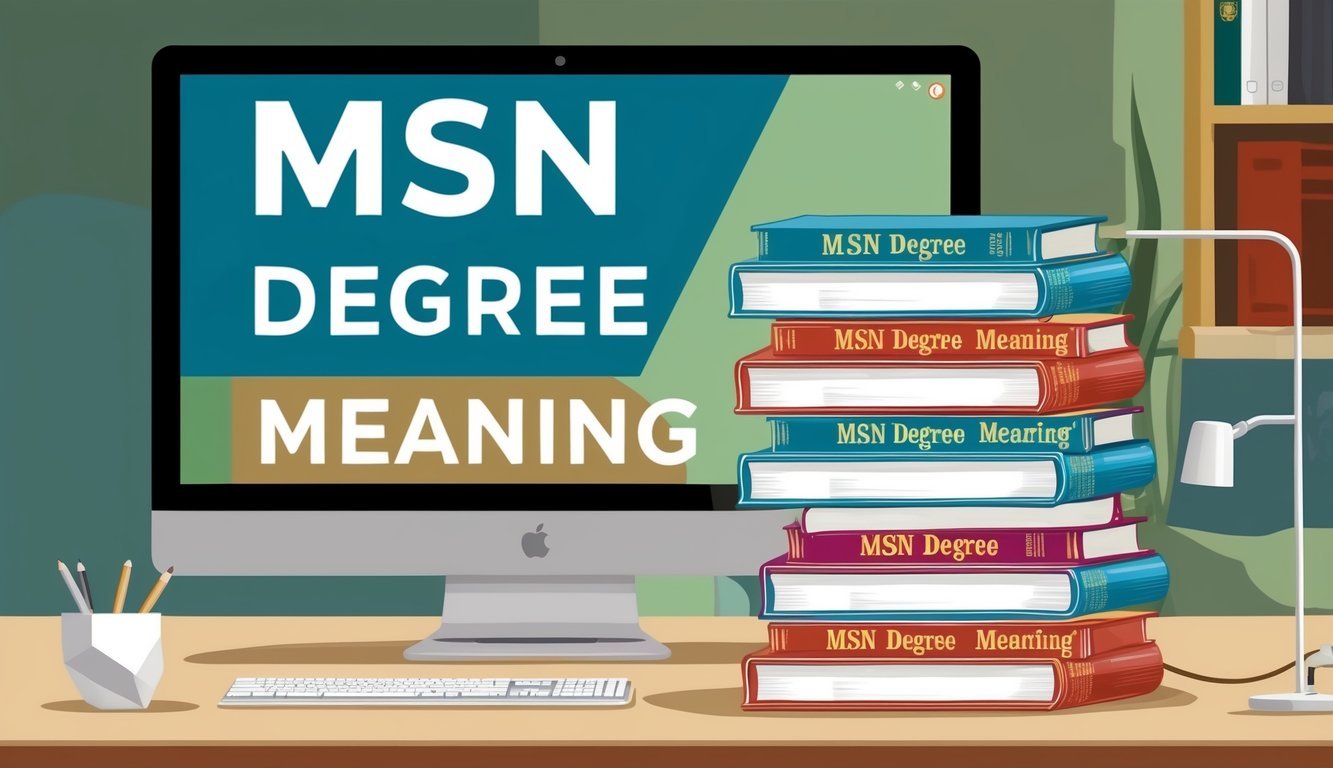The Master of Science in Nursing (MSN) degree is essential for nurses aiming to enhance their careers.
This advanced degree offers you specialized training in areas such as nursing leadership, advanced practice nursing, and education.
Whether you seek to deepen your clinical expertise or move into management, obtaining an MSN can open doors to various professional opportunities.
Pursuing an MSN means you will gain advanced knowledge and skills that prepare you for higher-level roles in healthcare.
With this degree, you can become an Advanced Practice Registered Nurse (APRN) or take on leadership positions that shape the future of nursing.
The blend of education and practical experience will position you for a rewarding career in diverse nursing fields.
As you consider advancing your nursing career, understanding the MSN degree’s significance is crucial.
It not only enhances your clinical abilities but also equips you for roles that impact patient care and health policy.
Key Takeaways
- The MSN degree enhances your skills for advanced nursing roles.
- It opens opportunities in nursing leadership and specialized fields.
- Earning this degree can lead to better career advancement and job prospects.
Overview of MSN Program
The Master of Science in Nursing (MSN) program offers advanced education for nurses seeking to specialize and enhance their skills.
This section covers the types of MSN degrees available, admission requirements, and typical curriculum, equipping you with essential information to navigate your educational path.
Types of MSN Degrees
There are several types of MSN degrees to fit your career goals:
- Direct-Entry MSN: This program allows individuals with a bachelor’s degree in a non-nursing field to enter nursing and obtain their MSN.
- RN-to-MSN: Designed for registered nurses with an ADN or diploma seeking to obtain their MSN while building on their experience.
- BSN-to-MSN: This option is intended for nurses with a Bachelor of Science in Nursing who want to advance their education.
- ADN-to-MSN: A less common pathway allowing associate degree nurses to enter an MSN program directly.
- Dual MSN Programs: These programs allow you to combine your MSN with another graduate degree, such as a Master’s in Business Administration or Public Health.
Each pathway supports various specialties and career opportunities, from clinical roles to administrative positions.
Admission Requirements
To apply for an MSN program, you typically need to meet these requirements:
- Nursing License: Most programs require a valid RN license, especially for RN-to-MSN programs.
- Educational Background: Most programs require a BSN or an ADN, depending on the pathway.
- GPA: A minimum cumulative GPA (often around 3.0) in previous coursework can be necessary.
- Letters of Recommendation: Many programs ask for two or more letters from professional or academic references.
- Personal Statement: An essay detailing your goals and motivation for pursuing an MSN degree is often required.
Check specific programs for additional criteria, such as standardized test scores or personal interviews.
MSN Curriculum
The MSN curriculum varies by specialization but generally includes core subjects like:
- Advanced Health Assessment: Techniques for evaluating patients comprehensively.
- Nursing Theory: Understanding frameworks that guide nursing practice.
- Research Methods: Methods to conduct and analyze nursing research effectively.
- Leadership and Management: Preparing you for administrative roles in healthcare.
Most programs may also offer opportunities for clinical practice, ensuring you gain hands-on experience.
Many universities provide online MSN programs for flexibility.
Enrolling in an online format allows you to balance your education with work and personal life while pursuing advanced nursing roles.
Consider exploring options, such as NurseJournal, for more details on MSN programs.
Advanced Practice Nursing Roles

Advanced practice nursing includes several specialized roles that require advanced education and clinical training.
Each role has distinct responsibilities, focusing on specific areas of patient care.
Understanding these roles can help you decide on the best path for your nursing career.
Nurse Practitioner
Nurse Practitioners (NPs) are highly educated professionals who can perform many tasks similar to physicians.
They often diagnose and treat health conditions, manage patient care, and prescribe medications.
NPs can specialize in various areas, including:
- Family Nurse Practitioner (FNP): Focuses on family health across all ages.
- Psychiatric Nurse Practitioner: Specializes in mental health care.
With their advanced training, NPs provide comprehensive care and often serve as primary care providers.
They work in diverse settings, such as hospitals, clinics, and private practices.
For more details, visit Advanced Practice Registered Nurse Career Overview.
Clinical Nurse Specialist
Clinical Nurse Specialists (CNS) are experts in a specific field of nursing.
They focus on improving patient outcomes through evidence-based practice, education, and consultation.
Some key responsibilities of CNSs include:
- Providing expert care in a focused specialty area.
- Educating staff and patients on best practices.
- Consulting with healthcare teams to optimize patient care.
CNSs can work in various areas, such as pediatrics, geriatrics, or critical care.
Their advanced knowledge allows them to influence healthcare policies and practices effectively.
More information about this role can be found at What Is An APRN – Advanced Practice Registered Nurse.
Nurse Anesthetist
Nurse Anesthetists, or Certified Registered Nurse Anesthetists (CRNAs), are essential in managing anesthesia for surgical and other medical procedures.
They undergo rigorous training to ensure patient safety during the anesthesia process.
CRNAs perform several critical functions:
- Administering anesthesia and monitoring patients.
- Assessing patient risks related to anesthesia.
- Providing post-anesthesia care to ensure patient recovery.
With their specialized skills, CRNAs often work independently in a variety of settings, including hospitals, surgical facilities, and pain management clinics.
To learn more, visit Advanced Practice Nursing Roles, Regulation, Education, and Practice.
Nurse Midwife
Nurse Midwives, or Certified Nurse Midwives (CNMs), specialize in women’s reproductive health.
They provide care throughout pregnancy, labor, delivery, and the postpartum period.
Key responsibilities of Nurse Midwives include:
- Conducting prenatal care and educating expectant mothers.
- Assisting in childbirth, including home births and hospital births.
- Providing gynecological care for women throughout their lives.
CNMs can also offer family planning and counseling, making them vital in women’s health.
Their holistic approach emphasizes both physical and emotional care.
More details can be found at What is an APRN? Advanced Practice Registered Nurse.
Specialized Nursing Fields and Education
In the nursing profession, specialized fields offer unique roles that require specific education and skills.
This section highlights key nursing specialties, their educational requirements, and their roles in healthcare.
Nursing Informatics
Nursing informatics is a blend of nursing science, computer science, and information technology.
It focuses on the management and analysis of health data to improve patient care.
Nurses in this field use data to inform decisions, enhance patient outcomes, and streamline healthcare processes.
Effective informatics can lead to better communication among healthcare providers and contribute to research and policy development.
To work in this area, you typically need a Master of Science in Nursing (MSN) with a focus on informatics.
Core subjects include healthcare technology, data management, and systems analysis.
As electronic health records (EHR) become standard, informatics specialists are increasingly in demand.
Nurse Educator
As a nurse educator, you play a crucial role in training the next generation of nurses.
This position often exists in academic settings such as colleges and universities, as well as in clinical environments.
Your responsibilities may include developing curricula, teaching courses, and mentoring students.
Strong teaching skills, knowledge of nursing theory, and experience in clinical practice are essential.
You will also stay updated with the latest healthcare trends and policy changes to provide relevant education.
To become a nurse educator, you generally need an MSN degree and possibly a Doctor of Nursing Practice (DNP) or a PhD.
Additional certification, such as the Certified Nurse Educator (CNE) credential, can enhance your qualifications.
Nurse Administrator
Nurse administrators are responsible for overseeing nursing staff and ensuring quality patient care.
They work in various settings, including hospitals, clinics, and healthcare organizations.
In this role, you manage budgets, implement policies, and coordinate nursing services.
Skills in leadership, finance, and human resources are important.
Nurse administrators often engage with health policy to advocate for changes that improve healthcare delivery.
To enter this field, an MSN with a focus on administration or leadership is essential.
Coursework typically covers management theory, healthcare law, and organizational behavior.
Gaining experience in clinical practice can also be valuable for a well-rounded perspective.
Public Health Nursing
Public health nurses focus on community health and wellness.
They work to prevent disease, improve health outcomes, and promote health education.
You may engage in activities such as health screenings, vaccination programs, and education on healthy lifestyles.
Collaborating with other health professionals and community organizations is often essential to address social determinants of health.
To work in this specialty, you typically need an MSN with coursework in public health theory and community health assessment.
Certification as a Public Health Nurse (PHN) may also be available and enhance your qualifications.
In all of these fields, continuous education and staying abreast of new developments in healthcare are key to being effective.
Clinical and Licensing Requirements

In pursuing a Master of Science in Nursing (MSN) degree, you must meet specific clinical and licensing requirements.
These are essential for ensuring that you are adequately prepared for advanced nursing roles.
Clinical Hours and Practicum
As part of your MSN program, you will need to complete clinical hours.
These hours often include direct patient care and can vary based on your chosen specialization.
Typically, MSN programs require between 500 to 1,000 clinical hours.
This hands-on experience is crucial for developing practical skills in areas such as health assessment, pathophysiology, and pharmacology.
Most programs incorporate a practicum, where you will work under the guidance of experienced professionals.
This allows you to apply your knowledge in real-world settings.
Completing these requirements helps prepare you for advanced practice roles, such as a Nurse Practitioner or Clinical Nurse Specialist.
State Licensure and Certifications
After completing your MSN, you will need to obtain state licensure.
This permits you to practice as an Advanced Practice Registered Nurse (APRN).
Each state has specific requirements, including passing a national certification exam.
You must hold a valid Registered Nurse (RN) License before entering an MSN program.
Additionally, some states require a Bachelor of Science in Nursing (BSN) as a prerequisite.
You can refer to the Nurse Licensure Compact (NLC) for information on multi-state practice.
Once licensed, you may pursue further certifications specific to your specialty, enhancing your career opportunities and professional growth.
Career Outlook and Advancement
The career outlook for those with an MSN degree is promising.
It highlights significant job growth, higher salary potential, and enhanced leadership opportunities in healthcare.
Exploring these aspects can help you understand the value of pursuing this advanced nursing degree.
Job Growth and Demand
The demand for nurses with an MSN degree is increasing.
Projections show that over half a million new Registered Nurse (RN) positions will be available by 2028.
This growth stems from both new job creation and the need to replace retiring nurses.
Many healthcare organizations seek qualified candidates for specialized roles.
Positions often require advanced education, making your MSN a valuable asset.
Working in specialties such as Nurse Practitioners or Nurse Midwives can open doors to even more opportunities.
Higher Salary Potential
Earning an MSN degree can significantly boost your earning potential.
Nurses with advanced degrees often earn higher salaries compared to their peers with just a bachelor’s degree.
For example, here is a salary comparison based on roles:
| Position | Average Salary |
|---|---|
| Registered Nurse (RN) | $75,000 |
| Nurse Manager | $90,000 |
| Nurse Practitioner | $105,000 |
| Healthcare Administrator | $120,000 |
These figures show how advancing your education can lead to better financial rewards.
Your investment in an MSN is likely to pay off in the long run.
Healthcare Leadership Opportunities
With an MSN, you can step into leadership roles within the healthcare field.
Many healthcare facilities look for nurses with advanced education for management positions.
Roles like Nurse Manager are critical for overseeing nursing teams and ensuring high-quality patient care.
You’ll also find opportunities in healthcare administration, enabling you to impact policies and procedures.
Furthermore, advanced education can prepare you for roles in nursing leadership, guiding changes in healthcare practices.
This supports better outcomes for patients and staff alike.
Your MSN can set you apart in the competitive healthcare job market, providing pathways to roles that influence both patient care and organizational success.
Frequently Asked Questions

When considering an MSN degree, you may have various questions regarding the steps to obtain it, the differences from other nursing degrees, and the potential career paths.
The following sections clarify these common queries.
What steps are involved in obtaining an MSN degree?
To obtain an MSN degree, follow these steps:
- Complete a BSN: Most programs require a Bachelor of Science in Nursing.
- Pass the NCLEX-RN: You need to be a licensed Registered Nurse (RN).
- Choose a program: Decide between direct-entry or RN-to-MSN programs.
- Complete coursework: Follow the curriculum which includes advanced nursing topics.
- Clinical practice: Gain hands-on experience through supervised clinical hours.
- Graduate: Complete all requirements to earn your degree.
How does an MSN degree differ from a BSN degree?
An MSN degree is a master’s level qualification, while a BSN is a bachelor’s degree.
The key differences include:
- Depth of study: MSN programs typically involve advanced concepts and specialized training.
- Career opportunities: An MSN qualifies you for leadership and specialized roles in nursing not available with a BSN.
What is the duration of study for an MSN degree?
The duration can vary based on the program type:
- Direct-entry MSN: Usually takes 2-3 years.
- RN to MSN: Typically takes 1-2 years if you already have a BSN.
Part-time study options may extend this timeframe.
What professional titles can a nurse with an MSN degree obtain?
With an MSN degree, you can pursue various advanced roles, including:
- Nurse Practitioner (NP)
- Nurse Educator
- Nurse Administrator
- Clinical Nurse Specialist (CNS)
- Nurse Midwife
These roles come with increased responsibilities and leadership opportunities.
How does an MSN prepared nurse’s role differ from that of a nurse practitioner?
While both have advanced training, their focuses differ:
- MSN prepared nurses often take on managerial, educational, or administrative roles.
- Nurse Practitioners provide direct patient care, diagnose conditions, and prescribe medications.
Each role supports the healthcare system in different ways.
What salary range can be expected after obtaining an MSN degree?
The salary for MSN degree holders can vary based on role, experience, and location.
Generally, you can expect:
- Nurse Practitioner: $95,000 – $120,000 per year
- Nurse Educator: $70,000 – $90,000 per year
- Nurse Administrator: $80,000 – $110,000 per year
Factors like location and specialization can significantly influence earnings.
For up-to-date salary information, visit reliable resources.

